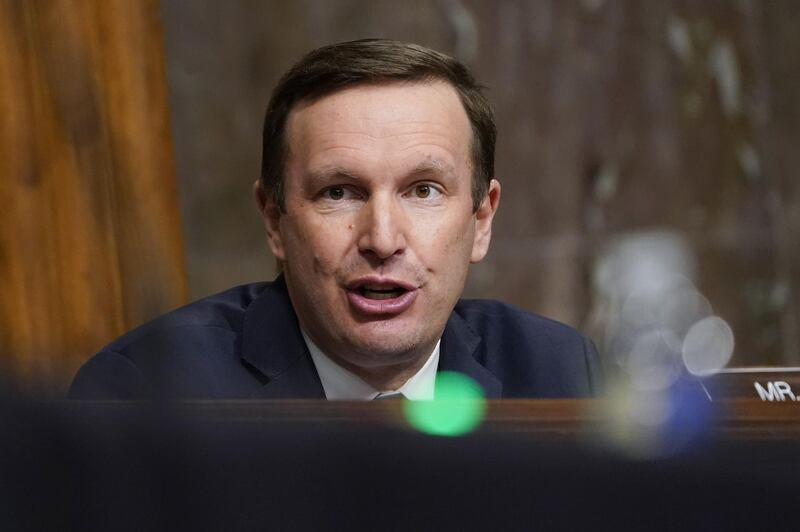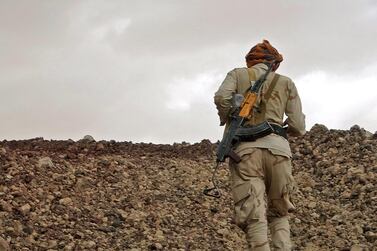Washington is urging Oman to take a tougher line on Yemen’s Iran-backed Houthi rebels as part of the Biden administration's initiative to end the six-year civil war.
Chris Murphy, chairman of the Senate’s Middle East panel, on Monday said a US delegation pressed the Omani government during a trip to the region last week to do more to convince the Houthis to join a proposed Saudi ceasefire.
Mr Murphy travelled with the US delegation led by US President Joe Biden’s Yemen envoy, Tim Lenderking, and met Sultan Haitham’s staff and members of the Omani Foreign Ministry.
“They are one of the few countries in the region that have the ability to talk to the Houthis and we made clear that it is time for them to press the Houthis to declare a ceasefire,” he said on Monday.
The US Navy said on Monday it had intercepted an arms shipment bound for Yemen in an unmarked dhow during an operation near Oman.
The US State Department rebuked the Houthis for their refusal to meet UN Yemen envoy Martin Griffiths in Muscat last week.
It said the rebels “passed up a major opportunity to demonstrate their commitment to peace".
“The Saudis have put forward a serious offer and it is now time for the Houthis to do their part,” said Mr Murphy, a frequent critic of US assistance for the Saudi-led coalition fighting to reinstate the internationally recognised Yemeni government.
Mr Biden ended offensive military support for the coalition in February.
“It likely speaks to the current state of mind of the Houthis," Mr Murphy said.
"They are missing an opportunity by refusing to engage seriously in discussion, but also passing up an opportunity to engage in a ceasefire that could lead to a serious political process.”
The Houthis have called on Saudi Arabia to end its blockade on Yemen before they agree to any ceasefire.
Mr Murphy called on the Houthis to end the assault on the oil-rich Marib province, the last northern stronghold of the government.
“It is imperative that the Houthis stand down in the assault on Marib and that the Saudis make commitments regarding an end to the blockade both on the Hodeidah port and the Sanaa airport that will allow more relief goods to flow in better into the country,” he said.
“If those two things happen, we can get to a political process that could seek a permanent end to the war.”
He said that while it was “not impossible” for the Houthis to take Marib, it was unlikely because the offensive had stalled for more than a year due to inhospitable terrain and local tribes who have banded together to defend the city, backed by the Saudis.
“As time goes on, the Houthis are realising that they may not be able to take Marib and that the offer from the Saudis may not last forever,” Mr Murphy said.
Mr Murphy also revealed that Saudi Arabia has asked Washington to resume some of the offensive US military support in Yemen that Mr Biden halted, saying what had been suspended was “very important to them.”
He also travelled to Qatar on his own to meet Minister of Foreign Affairs Sheikh Mohammed bin Abdulrahman.
In the meeting, Mr Murphy called on Doha to make a humanitarian aid commitment to Yemen as part of a UN appeal, which Qatar has not yet done.
The UN has so far only managed to raise about $1.7 billion of the $3.85bn aid appeal for Yemen.
“If we don’t make additional progress with respect to donor commitments, we’re going to see a famine in Yemen," Mr Murphy said.
He and Mr Lenderking also discussed the Yemen crisis in Jordan, where they joined another US delegation in the region led by Brett McGurk, the Middle East co-ordinator for the White House National Security Council.
The combined delegations spoke to King Abdullah on the need to pursue domestic reform in Jordan, the third-largest recipient of US assistance in the region.
“The time is now for the United States to play a little bit harder ball with the Jordanians in terms of the taxation reform and energy subsidies reform we need them to engage in order to stabilise the country,” Mr Murphy said.








